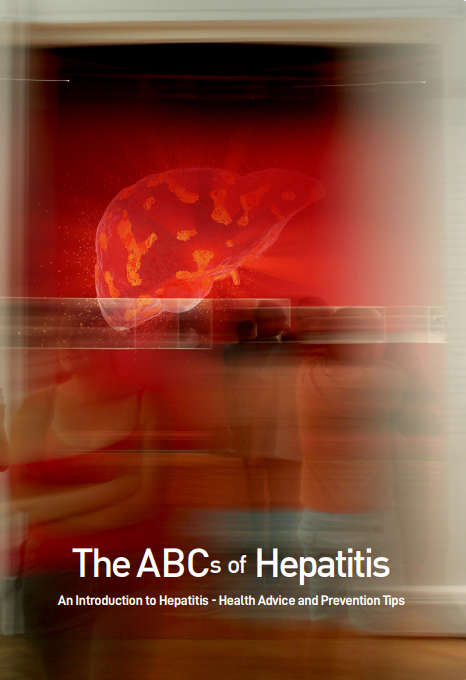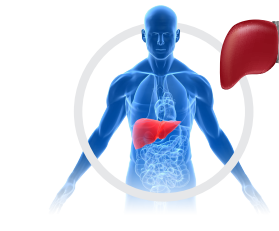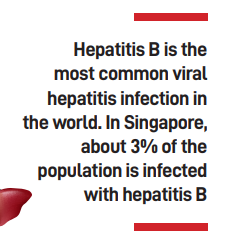
The liver is a vital organ that helps support digestion and metabolism of nutrition, and detoxification of our blood. It is positioned at the upper right quadrant of the abdomen below the diaphragm.
Hepatitis is inflammation of the liver. It can be caused by a number of different factors, but is most commonly caused by hepatitis viruses. Variants of viral hepatitis include hepatitis A, B, C and E. Hepatitis can be further differentiated into acute and chronic hepatitis. Acute hepatitis is a short-term infection which our body usually recovers from. Chronic hepatitis is a long-term infection (at least 6 months) which remains in our body for a long time. Both acute and chronic hepatitis may cause liver failure, which is fatal when the condition is severe.

ACUTE HEPATITIS
Hepatitis A and E cause acute hepatitis. Mild infections may have no symptoms, but severe infections may cause:
- Jaundice (Yellow colouration of skin)
- Fatigue
- Lethargy
- Poor appetite
- Nausea and vomiting
- Right upper quadrant pain
Diagnosis is made through performing blood tests for hepatitis A and E respectively. Hepatitis A is traditionally the most common type of acute hepatitis, but in recent years, hepatitis E has become more common and there is an increase in the frequency of infection. Both hepatitis A and E are transmitted through the stool of an infected person. Additionally, hepatitis E can also be transmitted through the stool of infected animals. Transmission often occurs via contamination of water or food due to poor hand hygiene or a contaminated water source. The infected person may remain contagious for a period after his/ her symptoms resolve.
There is no cure for hepatitis A and E infections. Most people recover in a few weeks with symptomatic treatment and hydration. Our body usually recovers fully, but there is a small risk of liver failure which is fatal. The risk of liver failure from hepatitis E is increased in pregnant women.

PATIENT ADVICE FOR ACUTE HEPATITIS:
Patients who suffer from acute hepatitis should observe the following advice:
- Home rest
- Drink sufficient water
- Avoid medication that can damage the liver (Consult your doctor)
- Avoid alcohol
- Consult your family doctor if symptoms worsen
- Maintain good hygiene with regular handwashing
PREVENTION OF ACUTE HEPATITIS
Prevention is better than cure. The following can be done to reduce the risk of acute hepatitis:
- Vaccination for hepatitis A
- Avoid eating high risk foods, such as undercooked pork, offal and shellfish
- Avoid drinking water from unsafe sources
When our liver fails, it is unable to perform its vital functions and this may lead to the following symptoms:
- Jaundice (yellow • Right upper quadrant pain colouration of skin)
- Itch
- Fatigue
- Abdominal swelling
- Lethargy
- Leg swelling
- Confusion
- Easy bruising
- Poor appetite
- Nausea and vomiting
Hepatitis B and C are chronic hepatitis. They are transmitted through contact with body fluids, such as during unprotected sexual contact and through use of contaminated injection needles. In adults, the initial transmission causes an acute infection with symptoms of acute hepatitis. These are often cleared by the body but sometimes, the virus remains in the body and this then becomes a chronic infection. Chronic hepatitis B and C may lead to cirrhosis and liver cancer.

Hepatitis B is the most common viral hepatitis infection in the world. In Singapore, about 3% of the population is infected with hepatitis B. The virus is usually transmitted from an infected mother to her infant because the immune system of the infant is immature, and unable to recognise and fight the hepatitis B virus. Allowing the virus to remain will result in a chronic infection. Hepatitis B is a DNA virus. This means that the virus embeds itself in the liver’s DNA, making it difficult to eradicate.
Hepatitis C affects about 1% of the world population. However, it is less common in Singapore. It is an RNA virus which spreads through contaminated injection needles and unprotected sexual contact with an infected person. The initial acute infection is like other acute viral hepatitis, and patients may be asymptomatic or experience lethargy, muscle ache and poor appetite. Around 70% of patients with acute hepatitis C will go on to develop chronic hepatitis C.
TREATMENT OF CHRONIC HEPATITIS
Treatment for hepatitis B and C comes in the form of oral antiviral medication and interferon injection. These attack the virus and enhance our body’s immunity to fight the virus. However, this treatment requires a long treatment duration and is not always successful.
In recent years, a new class of hepatitis C medication called direct-acting antivirals has revolutionised treatment. This new form of treatment has proved highly effective in curing the disease. Meanwhile, treatment for hepatitis B is only effective in controlling the amount of virus in the blood. The treatment is unable to remove the virus DNA embedded in the liver. Hence, medication may be needed long term. Not all chronic hepatitis B patients need treatment because the virus can remain dormant without causing any damage to the liver. However, there is an increased risk of developing liver cancer and liver inflammation with no symptoms, which may lead to liver cirrhosis. Therefore, doctors need to regularly monitor hepatitis B and C patients with blood tests and liver scans.
PATIENT ADVICE FOR CHRONIC HEPATITIS
Patients with chronic hepatitis should observe the following:
- See your doctor regularly to monitor your condition
- Most hepatitis B and C medications are usually long term, and their effectiveness can be severely diminished when medication is stopped abruptly. If you are on chronic hepatitis medications, do not stop your medication without consulting your doctor
PREVENTION OF CHRONIC HEPATITIS
The following may reduce the risk of chronic hepatitis:
- Hepatitis B vaccination is available and highly effective. It is provided for all infants in Singapore.
- Avoidance of high-risk activities, such as unprotected sexual contact and use of contaminated needles, is the key to prevention. Do note that touching, hugging and sharing of food will NOT spread the infection
- Pregnant mothers should also check their hepatitis B status so that treatment can be given to reduce the risk of infant transmission
Dr Wang Yu Tien
Senior Consultant, Gastroenterology and Hepatology, Nobel Gastroenterology Centre, Gleneagles Medical Centre
Dr Wang practices at Nobel Gastroenterology Centre. He has nearly 20 years of experience from Singapore General Hospital as senior consultant, director of research and a faculty of senior resident training at the department of Gastroenterology and Hepatology. Dr Wang is experienced in managing the full spectrum of gastrointestinal and liver diseases as well as endoscopy. His subspecialty interest is digestive function disorders (e.g. Gastroesophageal Reflux and Irritable Bowel Syndrome). He was also the former director of the Gastrointestinal Function Laboratory at Singapore General Hospital and past Scientific Chairperson of the Gastroenterology Society of Singapore. Dr Wang has published in top gastroenterology journals and has served as the Gastroenterology specialty editor of Singapore Medical Journal.













